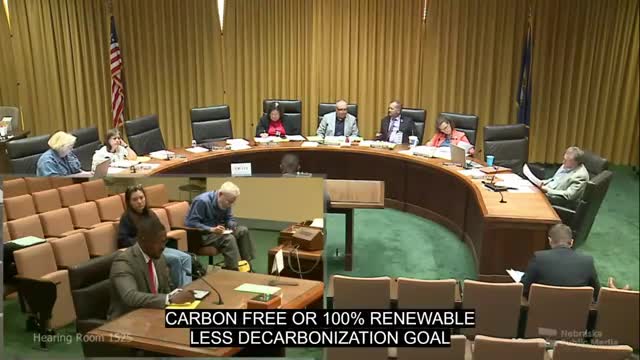Lincoln Electric System emphasizes local control in net zero carbon strategy
September 06, 2025 | Business and Labor , Standing, Committees, Legislative, Nebraska
This article was created by AI summarizing key points discussed. AI makes mistakes, so for full details and context, please refer to the video of the full meeting. Please report any errors so we can fix them. Report an error »

The Nebraska Legislature's Natural Resources Committee convened on September 5, 2025, to discuss key issues surrounding utility management and sustainability goals. The meeting focused on the importance of local control in utility services, the implications of achieving net-zero carbon emissions, and the operational strategies of local utilities.
The session began with a presentation emphasizing that local control is a fundamental strength of Nebraska's utility services. The speaker clarified that achieving net-zero carbon emissions differs from a 100% renewable energy goal, highlighting that net-zero requires balancing carbon emissions with equivalent removals from the atmosphere. This approach aims to reduce emissions while maintaining operational reliability and affordability for customers.
The discussion included the utility's commitment to a balanced resource planning process, which considers service obligations, fiscal responsibility, and environmental stewardship. The speaker noted that the utility's board resolution allows for flexibility in achieving net-zero goals, ensuring that reliability and affordability are not compromised. There are no mandated timelines or cost estimates associated with this commitment, acknowledging uncertainties in technology and market conditions.
The Integrated Resource Plan (IRP) was also a focal point, with the speaker detailing the extensive deliberation and analysis involved in its development. The IRP process includes public input and is governed by a board appointed by the mayor of Lincoln, reinforcing the local governance structure.
Senator Lawrence raised questions regarding the board's composition and the utility's electricity rates compared to Omaha's. The speaker confirmed that board members are appointed by the mayor and confirmed by the city council, serving up to three consecutive three-year terms. While specific rate comparisons were not provided, the speaker committed to gathering that information.
The meeting transitioned to Bob Paling, the executive director of NMPP Energy, who discussed the role of the Municipal Energy Agency of Nebraska (MEAN). MEAN serves over 60 member communities and emphasizes local control and public power principles. Unlike other utilities, MEAN does not own generation facilities but relies on contracts and market participation to meet its members' needs.
In conclusion, the meeting underscored the commitment of Nebraska's utilities to local governance, sustainability, and responsible resource planning. The discussions highlighted the complexities of achieving environmental goals while ensuring reliable and affordable service for all customers. Further inquiries and follow-up actions were encouraged to enhance understanding and collaboration among stakeholders.
The session began with a presentation emphasizing that local control is a fundamental strength of Nebraska's utility services. The speaker clarified that achieving net-zero carbon emissions differs from a 100% renewable energy goal, highlighting that net-zero requires balancing carbon emissions with equivalent removals from the atmosphere. This approach aims to reduce emissions while maintaining operational reliability and affordability for customers.
The discussion included the utility's commitment to a balanced resource planning process, which considers service obligations, fiscal responsibility, and environmental stewardship. The speaker noted that the utility's board resolution allows for flexibility in achieving net-zero goals, ensuring that reliability and affordability are not compromised. There are no mandated timelines or cost estimates associated with this commitment, acknowledging uncertainties in technology and market conditions.
The Integrated Resource Plan (IRP) was also a focal point, with the speaker detailing the extensive deliberation and analysis involved in its development. The IRP process includes public input and is governed by a board appointed by the mayor of Lincoln, reinforcing the local governance structure.
Senator Lawrence raised questions regarding the board's composition and the utility's electricity rates compared to Omaha's. The speaker confirmed that board members are appointed by the mayor and confirmed by the city council, serving up to three consecutive three-year terms. While specific rate comparisons were not provided, the speaker committed to gathering that information.
The meeting transitioned to Bob Paling, the executive director of NMPP Energy, who discussed the role of the Municipal Energy Agency of Nebraska (MEAN). MEAN serves over 60 member communities and emphasizes local control and public power principles. Unlike other utilities, MEAN does not own generation facilities but relies on contracts and market participation to meet its members' needs.
In conclusion, the meeting underscored the commitment of Nebraska's utilities to local governance, sustainability, and responsible resource planning. The discussions highlighted the complexities of achieving environmental goals while ensuring reliable and affordable service for all customers. Further inquiries and follow-up actions were encouraged to enhance understanding and collaboration among stakeholders.
View full meeting
This article is based on a recent meeting—watch the full video and explore the complete transcript for deeper insights into the discussion.
View full meeting
